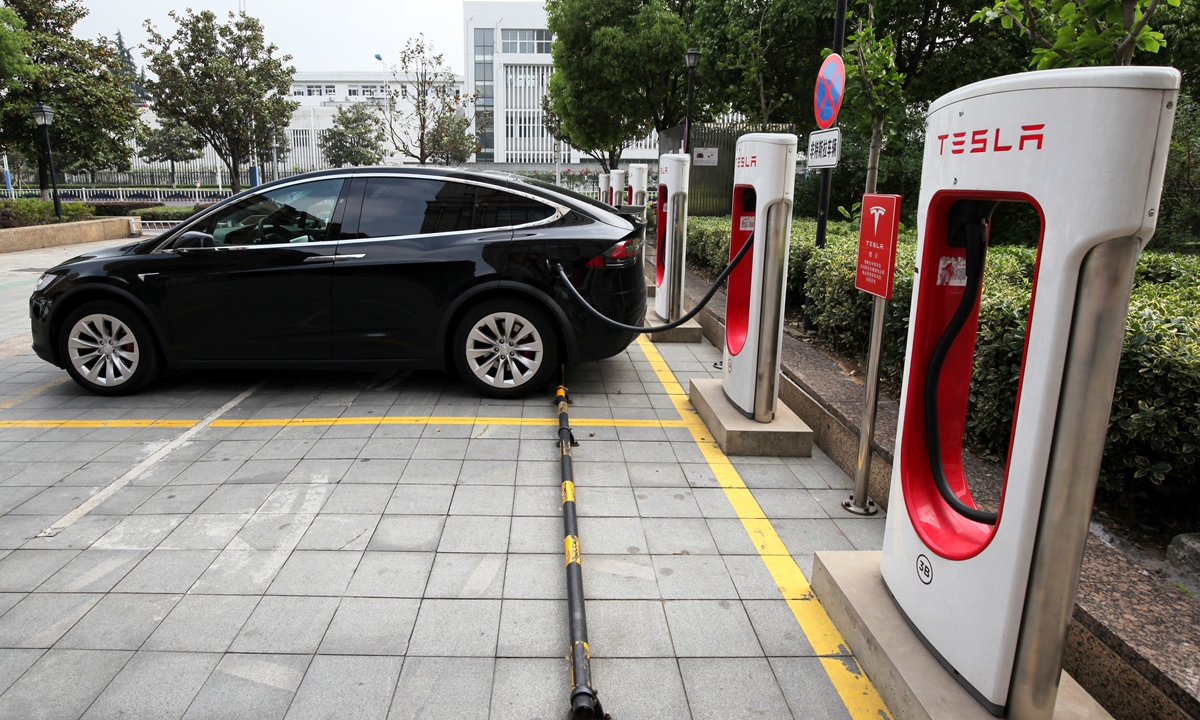Chinese car shoppers hold back after Tesla ends generous policy
By Qi Xijia Source: Global Times Published: 2020/10/18 19:03:40

Tesla electronic cars are being charged in Changzhou, East China's Jiangsu Province, on May 8. Photo: cnsphoto
Tesla has canceled a generous return policy that allowed buyers to return cars for a full refund within seven days, according to media reports. The move may cause more buyers to hold back to avoid the risks of its frequent price cuts.
"The confidence guarantee plan was discontinued and terminated on October 16, 2020. Car purchase orders after that will no longer be covered by the plan," read a screenshot of a Q&A page on Tesla's official website on Saturday.
The company hadn't responded to the Global Times' request for a concrete reason for ending the "no questions asked" seven-day return policy on Sunday.
Under the plan, new clients unhappy with their purchases could return cars for full refunds within seven days after taking delivery as long as there was no damage and there was less than 1,600 kilometers on the odometer.
Many consumers worried that the removal of the policy will put them at risk from frequent price cuts by the US-based electric carmaker. For buyers who have just picked up a car, a sudden price cut can hurt their interests.
Yang Jianhua, a resident in Shanghai who plans to buy a domestic version of the Tesla Model 3, said that the removal of the plan led him to postpone his purchase. "I will have to make sure that Tesla won't cut prices within the short term before I place an order," Yang told the Global Times.
On October 1, Tesla announced its latest round of price cuts on the Chinese-made Model 3.
The starting price of a standard driving range domestic Model 3 sedan was reduced by about 8 percent to 249,900 yuan ($37,310). The price for Model 3 vehicles with a longer range fell to 309,900 yuan from 344,050 yuan.
It was the seventh time that Tesla cut prices in China. Compared with the initial price of 355,800 yuan for the entry-level Tesla Model 3 announced in October 2019, the price has dropped by more than 100,000 yuan.
Feng Shiming, an independent car analyst, told the Global Times that the termination of the plan and Tesla's unpredictable price cuts will cause consumers to question the brand's credibility.
"Tesla's price cuts have caused many to return their cars to cover their losses. Such an option may have affected actual sales and increased operating costs for Tesla," Feng said. "The removal of the refund plan can reduce costs for the company in the short term, but it will damage customer confidence in the brand in the long run."
The US electric carmaker also faces questions from Chinese users regarding the update of the Chinese-made Model 3, which appears to be lagging behind its US-made counterpart.
In response, Tesla's China Vice President Tao Lin said on Sina Weibo on Sunday that it is impossible for the Shanghai factory to copy the US supply chain, and the new local supply chain needs more time for engineering verification and advancing.
She added that with advances in local research and development and the supply chain, it is expected that some future updates will be first launched in the Chinese market.
Tesla sold 11,329 vehicles in China in September, lower than the 11,800 vehicles in August, ranking third in sales of new-energy vehicle companies in September, according to data released by the China Passenger Car Association (CPCA).
"Sales by Tesla could continue their downward trend and fall below the monthly threshold of 10,000 in October," Feng said.
Chinese electric cars are gaining ground on the US carmaker with new records set in September.
NIO said its sales increased 133.2 percent year-on-year in September to 4,708 units, which pushed total sales in the third quarter to 12,206, a record high with a 154-percent increase.
XPeng Motors delivered 3,478 cars in September, an increase of 145 percent on yearly basis, a new record for a single month's deliveries in 2020.
Newspaper headline: Car shoppers hold back as Tesla ends easy return policy